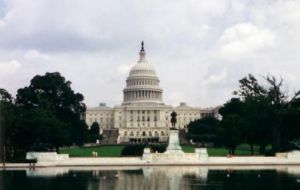MercoPress. South Atlantic News Agency
“Generous” contributions to US lawmakers to uphold embargo of Cuba
 At least 357 US federal candidates received donations since 2004
At least 357 US federal candidates received donations since 2004 Since the United States 2004 election cycle, a network of Cuban-American donors and political action committees (PACs) has donated in excess of 10 million US dollars to more than 300 US federal candidates in order to thwart any changes in the US embargo of Cuba, claims Public Campaign, a US citizens group working for “clean money, clean elections”
“Recipients are Democrats and Republicans, House and Senate members, rank-and-file members and party leaders. Contributions are sometimes coordinated and mutually reinforcing. These donations were often targeted to members of Congress who changed their positions on US-Cuba policy to align them with opponents of change, sometimes within days or a few weeks of making the switch”.
However with support growing for reforms of US policy toward Cuba, including lifting the ban on travel by all US residents to the island, and with congressional hearings on travel to Cuba about to take place before the House Foreign Affairs Committee, “the question is whether reasoned policy or old-style politics driven by the corrosive influence of campaign donations will prevail”.
In the most extensive analysis of hard-line Cuban-American campaign donations to date, Public Campaign has made visible the following facts and findings.
To preserve the US embargo of Cuba, the US-Cuba Democracy PAC and the network of hard-line Cuban American donors:
• Made donations of 10,777,692 US dollars since the 2004 election cycle
• Gave to at least 337 federal candidates through the PAC, 53% of whom received reinforcing individual donations from hard-line Cuban-American donors
• Vastly increased Cuban-Americans’ donations to the Democratic Senatorial Campaign Committee (DSCC) even as the DSCC has underperformed in overall fundraising compared to a similar point in the 2007-2008 election cycle
• Provided significant resources to their champions (with contributions aggregating as high as 366,964 USD), who include fifteen top recipients. Some of these champions recycle contributions to, or raise money for, other members, thereby building their power base to help stop Cuba policy changes
• Targeted donations to recipients whose voting record shows a shift in their position on Cuba policy, including seven who took money and switched their positions on dates that were in close proximity to one another
• Provided, through the PAC and the network of donors, more than 850,000 USD to 53 members of Congress who recently publicized their opposition to changes in the policy just weeks before a key committee hearing on travel to Cuba
The report begins with a summary of the scope of this hard-line network, sections on both the momentum towards changing Cuba policy and the response from the hard-line community to counter that momentum, and a detailed analysis of the different ways in which they use campaign contributions to press for their views.
The report closes with recommendations for policies to address the overarching problem of money in politics.




Top Comments
Disclaimer & comment rules-

Read all commentsOnce again, money talks. Welcome to politics as usual.
Nov 18th, 2009 - 04:08 am 0Commenting for this story is now closed.
If you have a Facebook account, become a fan and comment on our Facebook Page!